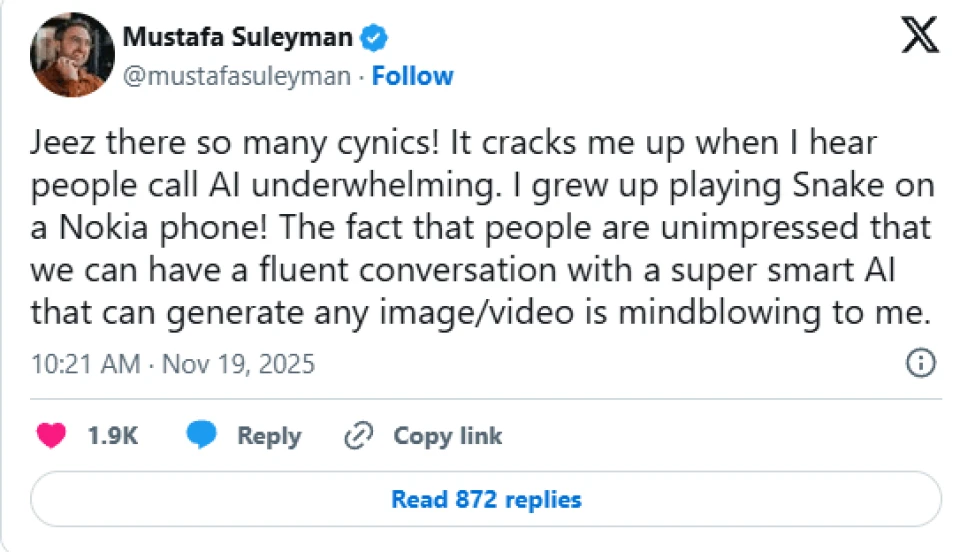Microsoft AI CEO Mustafa Suleyman says he is mind blown that people are unimpressed by conversational and generative AI, but the reaction to his comments shows how deep the trust problem around Windows and AI now runs.
In a recent post on X, Suleyman pushed back at critics who called AI underwhelming, writing, "Jeez there so many cynics! It cracks me up when I hear people call AI underwhelming," and pointing to fluent chatbot conversations and instant image or video generation as proof that the field has already crossed a historic threshold. His tone was half-amused and half frustrated, as if the public simply did not appreciate how far the technology has come in a short time.
The timing of that post was not an accident. It followed a fresh wave of anger after Windows president Pavan Davuluri described Windows as "evolving into an agentic OS," a platform where AI agents handle user commands and operate on files and tasks on the user’s behalf. The announcement set off days of backlash across forums and social media, where users complained that Microsoft was more focused on AI branding than on fixing bugs, performance issues, and long-standing frustrations with Windows itself.
 Critics were not saying that AI has no value. They were asking why so many basic issues remain unresolved while new AI features are bolted on top. Power users pointed to years of forced Microsoft Account prompts, confusing settings, aggressive OneDrive integration, and a general sense that Windows has become harder to control. Some commenters openly said they preferred the stability and clarity of Windows 7 or have already moved to Linux, not because they hate AI but because they no longer trust Microsoft’s judgment about what should be in the operating system.
Critics were not saying that AI has no value. They were asking why so many basic issues remain unresolved while new AI features are bolted on top. Power users pointed to years of forced Microsoft Account prompts, confusing settings, aggressive OneDrive integration, and a general sense that Windows has become harder to control. Some commenters openly said they preferred the stability and clarity of Windows 7 or have already moved to Linux, not because they hate AI but because they no longer trust Microsoft’s judgment about what should be in the operating system.
We have already seen how this plays out in practice in our earlier coverage of Microsoft’s agentic Windows plans, where one social media post about AI agents watching your screen and acting on your behalf turned into a full-scale debate about control, telemetry, and monetization rather than raw capability. That analysis of Windows OS intelligence and the agentic OS vision made clear that the loudest objections came from users who know how powerful AI can be, but do not trust Microsoft to deploy it in ways that respect their preferences.
Security concerns only raise the stakes. With Windows 11 already under scrutiny for how it handles AI-assisted features and system-level data collection, many users see agentic capabilities as a risk multiplier rather than a convenience. That context makes the anger around Davuluri’s announcement easier to understand, especially when it intersects with ongoing worries about Windows updates, telemetry, and attack surfaces that we explored in our look at the Windows 11 AI feature security warning.
From that perspective, Suleyman’s confusion reads less like a technical disagreement and more like a mismatch of priorities. From the executive view, AI looks like a once-in-a-generation opportunity: new revenue streams, new device categories, and a chance to reposition Windows as a canvas for AI. From the user view, AI is arriving inside an operating system that already feels bloated and over-monetized. Complaints about "AI in everything" are often really complaints about being forced into changes that do not solve the problems people actually face at work or in class.
For people who are learning AI and machine learning, this is an important signal. Raw skills in model building, prompt engineering, or tool integration matter, but the market is clearly starting to reward people who can connect AI to real user needs, communicate tradeoffs, and design features that improve trust instead of eroding it. If you are building a portfolio, you will stand out more by shipping projects that solve concrete problems for users than by stacking demos that only showcase what a model can do in the abstract.
The backlash also overlaps with a broader anxiety about jobs and power. We have already covered how AI is reshaping the entry-level job market for Gen Z and younger workers, and how that shift can close off traditional career ladders even as new roles appear at the top. If AI is widely perceived as something executives deploy to cut headcount or push subscriptions, resistance and regulation will grow, which in turn limits how far and how fast new systems roll out.
For learners, that dynamic creates a strong incentive to understand labor impacts and policy debates, not just the math. Our analysis on the impact of AI on the Gen Z job market is one example of how to frame these questions with data rather than hype.
None of this means Suleyman is wrong about the technical leap that has already happened. The ability to talk to a system that remembers context, writes code, and generates media is a real break from the past. The question is whether companies like Microsoft will respect the difference between what is technically impressive and what is socially acceptable.
For now, the disconnect between leaders who see skepticism as "mind-blowing" and users who feel steamrolled by AI-centered roadmaps is a warning to anyone building in this space: if you do not listen carefully to the people who use your products, the gap will eventually show up in your adoption metrics, not just in your mentions.
